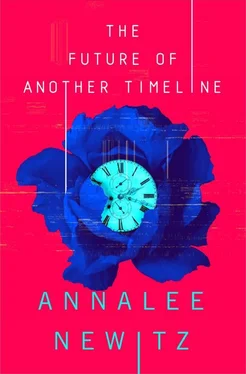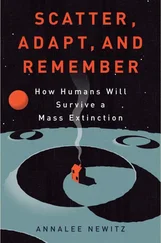“Nice view, Professor Biswas.” I immediately regretted my terrible attempt at a joke, but she smiled.
“Please call me Anita. My father is Professor Biswas. What can I do for you?” Sitting across from her, I realized Anita was pretty young for a professor—possibly in her early thirties.
“I don’t understand the difference between the two theories of history. Isn’t collective action still aimed at affecting a few great men? I mean, a protest is a form of collective action, but aren’t they protesting because they want to change what powerful politicians do?”
Anita twirled a pen over her thumb and nodded. “That’s a good question. The difference is that the Great Man approach assumes there are only a few people who can change the timeline at any given moment, and by the way they usually happen to be male.” She snorted. “But the Collective Action approach assumes that change is a complex process that comes from many quarters, with many people participating. So the end result might look the same, but the process is quite different.”
“But it still seems like you have to be a powerful person to change the timeline.”
“Maybe. From my perspective as a traveler, I think the main advantage of the Collective Action hypothesis is that it accounts for context. Let me give you an example. In 1993, I can be a professor and order you to write a midterm essay and you’ll do it. I’m kind of a great man, if you think of it that way. But when I’m back in the eighteenth-century Caribbean, where I do my research, most people assume I’m a slave. Sometimes I get classified as a free person of color because I’m half-Indian. My point is, there is no way for me to become a great man in that era, no matter how great I might be objectively. If I want to change anything, I need a community that recognizes my inherent awesomeness. That’s where your collective action comes in. You can’t become great without a community that recognizes you. But the Great Man theory suggests that certain special people are great regardless of context.”
I thought about that for a while. “So does collective action mean a bunch of people have to band together to edit the timeline, or can they be… kind of disconnected people making a lot of different edits?”
“It’s probably a mix of both, but the honest answer is that nobody knows for sure.” She ran a hand over the close-cropped froth of her hair and I noticed she wore purple nail polish. “Are you interested in traveling one day?”
“I like your class a lot, but I’m more interested in the physical side. I want to study the origins of life in the Cambrian.”
“Well, most of the Machines seem to originate in that same geological period, so maybe you’ll wind up studying them a little bit too. There is some great work on wormholes happening here at UCLA.”
I’d never thought about researching time machines, and I was suddenly intrigued. “Where do you think the Machines come from?”
Anita gave an elaborate shrug. “It’s not really my area, but the jury is definitely out on that one. Some people say it’s a natural consequence of crustal formation that we don’t understand yet. But that doesn’t explain the interface, and why it filters out weapons but not clothing. I’ve always been fond of the idea that it was aliens.”
I was surprised. “Really? Do people think that?”
“Sure. Or that it was a primordial civilization on Earth. There’s so little evidence that you can imagine a lot of things. Most geologists agree that the Machines were built, or at least the interface was. There’s some kind of intelligence behind them. It’s not a phenomenon created by plate tectonics or weathering or any other known geophysical process.”
“But there is a physical process involved. The timeline itself—”
“Sure. The Machines seem to be exploiting a force that pulls potential timelines into our own. But there’s a conundrum there, too. Let’s say there is a cosmic force that is engaged in a constant background shuffling of timelines in the universe. It’s like gravity, or an unknown form of energy—it’s causing historical change all the time. If that’s true, maybe the Machine is simply a viewing booth that allows us to see the shuffling. So we think we’re changing things, but that’s an illusion. We’re merely witnessing, or remembering, a change that would normally be imperceptible.”
Now I was frustrated. “So nobody knows how historical change works culturally or physically? How can we… I mean, what are we even doing?”
Anita grinned. “You really should study time machines. We all start out with that same what-the-hell feeling. It’s probably the main driver of scientific insight.”
I wasn’t any closer to knowing what I wanted to write in my essay, but I was intrigued by the idea of studying the Machines. As I wandered into the afternoon sun, I thought about all the possible timelines reshuffling in Tess’s wake. Was it a natural process that Tess could see because she used the Machines? Was she a tiny part of an unfathomably complex collective action that caused the shuffle? I wandered south toward Westwood, barely noticing as the hangar-sized campus buildings gave way to city streets. I passed a few bars and a Tower Records before finding myself at Falafel King, where I realized that I was incredibly hungry.
Falafel King served up the best pita sandwich in L.A., topped with crispy disks of potato and at least five kinds of spicy salad. As I ordered, I wondered with a twinge if I’d be able to afford this place once I was on financial aid.
All the tables in the restaurant were jammed, so I hunkered down on the warm sidewalk outside, watching a line of students waiting to order stoner fuel from Stan’s Donuts nearby. I was wiping some white sauce off my T-shirt when I heard a familiar voice.
“Hey, Beth?”
I looked up and immediately wished I wasn’t holding a messy sandwich that kept dripping tahini. “Hey, Hamid.” I scrambled up and surreptitiously wiped my hands on my jeans.
“Fancy meeting you here.” He had the same lopsided smile that made me want to kiss him, and I tried not to think about that as I twisted the edges of my sandwich wrapper.
“What are you up to?”
“Getting some donuts for my study group. Midterm madness.”
“Oh yeah? What class?”
“History of film.”
That was unexpected. “What happened to pre-med or business?”
“I keep forgetting to take classes in those.” He leaned easily against the wall and I realized he wasn’t exuding that melancholy neediness I remembered from high school. He seemed more stable. Happier.
“I’m getting ready for a midterm too. I have to write about collective action in history, but it turns out that nobody knows how history works.”
We started talking about the timeline, and the montage technique in film, and whether chocolate donuts were better than glazed. After I finished my pita, I decided to get a donut at Stan’s. Hamid said his study group was at the library, in the same general direction as the dorms, so it made sense to walk together back to campus.
“I’m glad I finally ran into you. I thought I would probably see you at some point.” Hamid ducked his head and looked embarrassed. “Not that I was hunting around for you or anything.”
“I’m glad we ran into each other too.”
“Hey, do you have… an e-mail address?” Hamid said the word “e-mail” like he was describing something extremely obscure and fancy.
“Of course. I got one on my first day of classes.”
“I just got one! I could send you my first e-mail!”
“Really? Your first e-mail? Didn’t your family have AOL?”
“I mean, I guess my sister had AOL. I never used it, though. It seemed like it was mostly for people talking about boy bands.”
Читать дальше








![Аннали Ньюиц - Автономность [litres]](/books/424681/annali-nyuic-avtonomnost-litres-thumb.webp)



